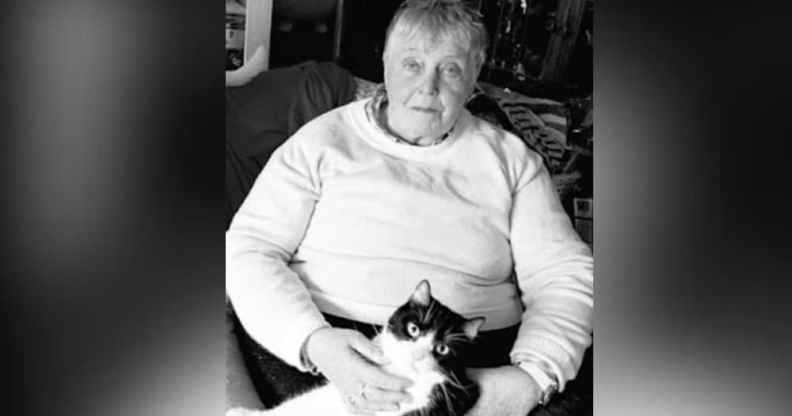Mary Cunningham Simpson, the UK’s forgotten lesbian pioneer, tragically dies aged 74

Mary Cunningham Smith (Picture used courtesy of the Wiltshire Gazette & Herald/Paul Johnson)
Mary Cunningham Simpson, a pioneering lesbian campaigner who fought for the rights of same-sex couples in the UK, has sadly passed away aged 74.
Mary was at the forefront of the early LGBT+ rights movement in the 1980s as she challenged laws that discriminated against same-sex relationships – yet today her achievements are widely forgotten.
In 1986 she became the first woman to take a case to the European Convention on Human Rights in an attempt to gain legal protections for cohabiting same-sex couples.
Although her case was unsuccessful it provided an important basis for future cases that ultimately led to a change in the law, both in the UK and at the European level.
“The world should remember Mary Simpson and all she stood for,” sociology professor Paul Johnson, who interviewed Mary in 2015, told PinkNews.
“Mary was a pioneer. She brought one of the earliest cases under international human rights law challenging discrimination against same-sex couples. She did this at a time when same-sex couples had no legal protections in the UK, and when homophobia was endemic.
“She suffered attacks on her home, and her campaign took a significant toll on her life. But she would not give up, and she would not give in… She is a lesbian hero and should be honoured as such.”
Mary Cunningham Simpson was ahead of her time
Mary’s fight began when her partner, Nicky, died in 1984, which led to Mary being threatened with eviction from the council house they shared.
They’d lived as a married couple for years, running a joint household, sharing all expenses and sleeping in the same bed, but that meant nothing as the law at the time only made provisions for “husband and wife”.
Mary refused to leave her home and the council launched legal proceedings against her. But she refused to back down, taking her fight to the County Court, the Court of Appeal and finally the European Court of Human Rights.
Her case is now believed to be one of the earliest attempts to establish that rights and benefits associated with marriage should extend to partners of the same sex.
She had a deep-seated desire to live in a society that cherished the freedom for everyone to be themselves
“Although Mary had been treated very cruelly by others she responded not with anger or bitterness, but with a quiet determination to live the life she wanted to live.
“She was kind to others, and had a deep-seated desire to live in a society that cherished the freedom for everyone to be themselves,” Johnson said.
“As she told me: ‘I’m me. There are no two people like me. I am me. I will fight for my rights and I will keep on fighting until everybody gets their share of their rights.'”
Tragically the European Commission of Human Rights dismissed Mary’s application, stating that a same-sex relationship fell outside of the scope of the “family life”, “private life” or “home” section of Article 8.
Her treatment by the Commission at that time was not atypical, since complaints about discrimination on the grounds of sexual orientation were routinely rejected.
But despite the many hardships and rejections she faced, Mary regretted none of it.
I’m proud that I stuck my neck on the block and tried to get something done
“You’ve got to keep chipping away at the paintwork, bit by bit, until you break through. I’m proud I did it. They walk about with gay pride, but I’ve got pride inside,” she said.
“I’m proud that I stuck my neck on the block and tried to get something done. It makes people realise that we can’t be trodden on. Because a lot of people think gays are the riff-raff of society, they’re the queer lot of society… and I thought, no, I’m not having it, I’ve got to do something to make people realise we’re still human beings. No matter which side of the fence we sit, we’re still human beings.”
Ultimately, Mary was ahead of her time: the type of discrimination she endured would persist in the UK until 2002.
Mary’s achievements were widely forgotten
Mary spent her final years in Calne, Wiltshire, where she was known for her love of animals – but not for her important legacy in the field of LGBT+ rights.
Now, many are calling for her to be remembered as the true lesbian hero she was.
“Mary Simpson was a true pioneer. She should be celebrated and recognised for her bravery and determination to fight injustice,” associate professor Loveday Hodson of the University of Leicester told PinkNews.
“Because her fight for recognition stemmed from what we might consider her private life, rather than in the public theatre of criminal law, it has received less attention and isn’t recorded in many history books.
“Mary deserves to be recognised as a warrior for lesbian rights.”
To learn more about Mary Cunningham Simpson and the case she brought to the European Court of Human Rights, check out Going to Strasbourg by Paul Johnson. You can read an excerpt from the book here.

